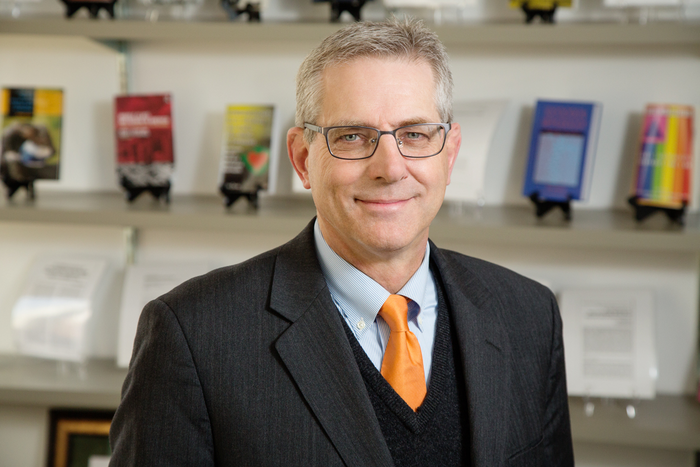CHAMPAIGN, Ill. — Once perceived as the epitome of the American dream and tickets to prosperity and social status, careers in professions such as law, medicine and science have lost their luster. The high social status, financial rewards and job security that were associated with these professions in the mid-20th century are elusive or nonexistent today – making these occupations less enticing to younger generations of workers, say sociologists Kevin T. Leicht and Mary L. Fennell.

Credit: Photo by Fred Zwicky
CHAMPAIGN, Ill. — Once perceived as the epitome of the American dream and tickets to prosperity and social status, careers in professions such as law, medicine and science have lost their luster. The high social status, financial rewards and job security that were associated with these professions in the mid-20th century are elusive or nonexistent today – making these occupations less enticing to younger generations of workers, say sociologists Kevin T. Leicht and Mary L. Fennell.
In their new book, “Crisis in the Professions: The New Dark Age,” published by Routledge, the authors explore the myriad economic, social and societal forces that have fundamentally changed the nature of elite occupations, not all of them for the better.
Leicht is a sociology professor at the University of Illinois Urbana-Champaign, and Fennell is an emerita professor of sociology and the Emerita C.V. Starr Professor of Commerce, Organizations and Entrepreneurship at Brown University.
The authors critically examine the micro- and macro-level forces transforming and sometimes undermining professions that are critical to society.
Their analysis centers on the current rancorous political climate in the U.S. – where reason and evidence are supplanted by “alternative facts” and disinformation – creating a new “dark age” in which all legitimate expertise and training are viewed as suspect and dismissed as elitist.
Through the lens of the U.S. response to the COVID-19 pandemic when intelligence sources began sounding the alarm about mounting infections and deaths in China and Europe, they contemplate the ominous repercussions when expertise is undermined and disregarded.
Burdensome student loan debt and the lengthy preparation involved in obtaining advanced and professional degrees are giving pause to young adults – and their parents – considering these professional careers, especially when jobs in the technology sector beckon with comparable or greater salaries and fewer educational hurdles, Leicht said.
The authors expand upon themes they first explored in their 2001 book, “Professional Work: A Sociological Approach.”
With law, medicine, higher education and other sectors outsourcing jobs and increasingly relying on contract workers such as hospitalists, medical scribes and adjunct instructors, Leicht and Fennell suggest that many professionals now resemble a class of workers called the “precariat,” whose jobs and livelihoods are insecure on multiple dimensions.
Among the precariat are college graduates with newly minted degrees – and often significant student loan debt – who are entering a labor market that’s glutted with people like them. Competing for a shrinking pool of jobs, many end up accepting work for which they are vastly overqualified and paid significantly lower wages, according to the authors.
“The labor market for professionals has changed quite a bit – and so has our respect for them,” said Leicht, also the science team lead at the U. of I. System’s Discovery Partners Institute in Chicago.
“Between social media misinformation and the general attacks on experts, the problems in professional labor markets and in acquiring professional training, we’re making it harder and harder to become a professional and make a living at it.”
The authors examine the prioritization in the U.S. of building its workforce in science, technology, engineering and medicine, and recruiting people from traditionally underrepresented groups. Yet, many of those who earn degrees in STEM fields have no concrete career plans when they graduate and enter the labor market, according to Leicht and Fennell.
“There’s quite a bit of discussion in the book about the problems in the profession for Ph.D. scientists,” Leicht said. “We tend to think everyone should go into STEM. But there are parts of STEM that are doing well and parts where it’s very difficult to establish yourself, particularly at the Ph.D. level.
“The average Ph.D. scientist at a Research 1 University must pursue grant money to pay for what their laboratory does. Yet, a lot of the federal budget – particularly for basic scientific research – hasn’t increased with inflation at all.”
Today’s scientists also face a very different public and political climate than their predecessors, according to the authors. Held in high esteem by the public after World War II and viewed as the authorities – or, at least, as those with the ability to find the answers through research – scientists currently risk becoming the targets of vicious attacks in the media when their pronouncements on issues such as the environment, medical treatment and COVID-19 protocols run counter to the interests of those holding political or economic power.
The book’s epilogue, written last fall when the U.S. was emerging from two years of COVID-19 lockdowns and disruptions, assesses the devastating consequences when a virulent disease takes hold in a country that’s wholly unprepared because experts’ predictions and advice were disregarded.
In pondering the fallout from COVID-19 and the ongoing pain of the economic recession it triggered, the authors see a U.S. populace that’s dispirited and believes “that there is nobody in charge and that our government is no longer using experts to craft good policy. In fact, it almost looks as if our populist politicians wait for experts to speak and then do the exact opposite of what is recommended as a form of ‘cultural rebellion.’”
DOI
10.4324/9781003225485




